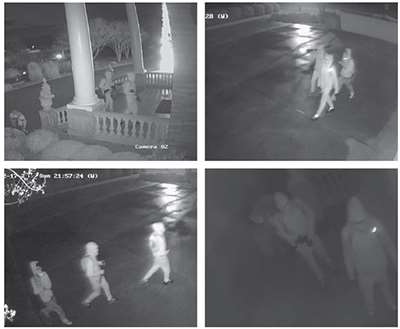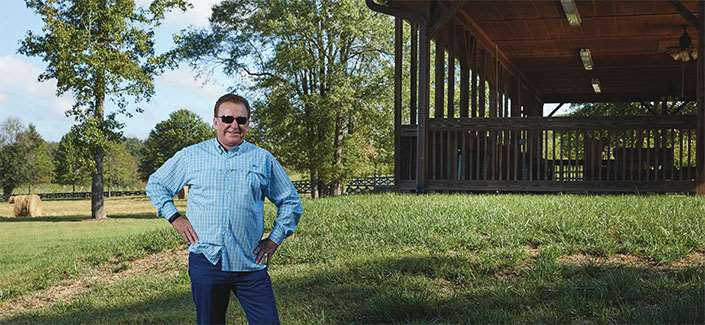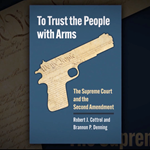
Many Americans know Richard Childress as one of the greatest team owners in auto racing, inducted into the NASCAR Hall of Fame in 2017. As a National Rifle Association member, you may know him as first vice president and as co-chair of the NRA Hunters’ Leadership Forum.
But to three armed thugs last December, Childress was a target.
After extensive preparation, on the night of Dec. 17, 2017, the trio invaded the Childress home. They planned to take Childress and his wife of more than 50 years, Judy, hostage.
But Childress was armed. “Thank God and our Second Amendment that I was able to have a firearm in my home to defend my wife and my family,” he said later that night.
This is his story.
Growing up, Childress wasn’t exactly famous. As a teenager, he helped support his family by selling peanuts and popcorn at Bowman Gray Stadium in Winston-Salem, N.C. He bought his first racecar for $20—an old 1947 Plymouth that had once been a taxi.
He first raced in a nascar event at the Talladega Superspeedway in 1969. Back then, Richard Childress Racing (RCR) was a one-man team—with Childress as driver, head mechanic and chief engine builder, working from his home garage.
Today, RCR employs more than 450 people at a 52-acre campus in Welcome, N.C. RCR teams have won more than 200 nascar races and 15 championships. RCR was the first team to earn championships in each of nascar’s three national touring series. And the great Dale Earnhardt won six of his seven nascar cups racing the iconic No. 3 Chevrolet for RCR.
Even if you never paid attention to auto racing, if you were a North Carolinian you would likely know of the Childress family. Richard and Judy are well-known philanthropists, and founders of the Childress Institute for Pediatric Trauma in Winston-Salem.
Sports championships and charity leadership have made Childress an admired national figure. But they also put a target on his back.
Childress’ home is in a small township in Davidson County, N.C. On the evening of Dec. 17, the couple was at home, relaxing in the trophy room. Childress had recently begun carrying his Smith & Wesson M&P 40 Shield, even while at home.
A week earlier, Judy had asked, “Why are you carrying your pistol everywhere in the house?”
He explained: “Honey, this time of year you don’t know what people are going to do or try to do. This is a time of year that people do crazy things.”
The night of the break-in at his home, Childress placed the S&W on a table in his dressing room, and went to bed at about 9 p.m. Judy came to bed less than an hour later after turning on the home alarm.

Neither of them knew that three men were already on their property. They had climbed the fence and broken a security camera at the gate. They were wearing black, and they had covered most of their faces with masks. Hiding on the property, they waited until their victims were asleep.
Then, they walked around the perimeter of the house “as if they owned it,” peering through windows and doors for 10 to 15 minutes.
The criminals had planned extensively. “They knew everything about us,” Childress said. They had GPS coordinates and “knew everything about the property.” They even knew enough about Childress’ security dog to convince him to stop barking. Their next step was to hack into the alarm system, with the intent to disable it.
The three men were armed with long guns, including a shotgun and a .308 rifle. In fact, just two days earlier they had stolen guns during a residential burglary in Winston-Salem.
Their intentions, they later admitted, were to break into the house, hold Richard and Judy hostage, and rob them.
“You know, after that, they don’t leave witnesses,” Childress said in a recent interview with America’s 1st Freedom. “So they came to do some bad, bad things to my wife and me.”
The invaders shattered a basement window, which didn’t have an alarm sensor. Next, they began breaking the basement door. At the time, Childress was still in a deep sleep.
“I think it was God’s will that woke me up when I heard them trying to get in the door.” Childress looked out the bedroom window and exclaimed, “Honey, someone’s trying to break in.” Judy told him to go back to sleep.
Then they both heard the door being broken down. Childress looked out the window again. “There are three of them, they’re armed!” he exclaimed. The three men started walking around in the direction of the bedroom door.
Childress had two handguns in his bedside table, and an AR-15 by a door. But he had just awoken from a deep sleep, so he ran to the dressing room and grabbed the S&W Shield.
With gun in hand, he rushed to the back door and around the corner of the house. His exit set off the alarm. As it turned out, the invaders’ attempt to disable the alarm had failed. Fortunately, the Childresses had recently put a new firewall in their alarm. (Childress now urges everyone to be aware that alarms can be hacked.)
By the time Childress was outside, the invaders had retreated 50 to 75 yards. “I just unloaded that [pistol], because I didn’t know if they were going to turn around and come back, or start shooting back, or what,” he said. “After that, I ran back inside real quickly.”
There, Childress grabbed his .45 S&W from the bedside table, went out the front door, and fired two warning shots. He kept four rounds in reserve, “in case someone else was around there to come and harm us.”
After that, the couple phoned the sheriff’s office. Due to the rural area, it would be 22 minutes before law enforcement arrived.
By then, the criminals were already gone. However, while the perpetrators had covered most of their faces, the surveillance video from Childress’ security system provided a starting point for law enforcement.
Several days later, the criminals went to a pawn shop to try to sell their stolen firearms and some other property from the earlier burglary. The three matched the partial descriptions of the Childress home invaders, so the pawn shop clerk informed law enforcement officials.
After obtaining search warrants, the Winston-Salem Police, the N.C. State Bureau of Investigation (SBI), and the Davidson County Sheriff’s investigators executed searches on two residences in Winston-Salem. The searches found evidence of the Dec. 15 burglary, and of the Dec. 17 home invasion against the Childresses. Three men were arrested: Chantz Kade Hines, Niquan Victorin and Armeka Vantonne Bosh Spinks.
Initially, the criminals claimed that they were just driving around and had decided on the spur of the moment to break into a big home they happened to see. But SBI investigation of the criminals’ cell phones and computers revealed that the crime had been carefully planned.
This spring and summer, the perpetrators pleaded guilty, pursuant to plea bargains. For the Dec. 15 crime, Hines admitted guilt for second-degree burglary as a principal, and to larceny after breaking and entering. For the Dec. 17 crime against the Childress family, he pleaded to first-degree attempted burglary and to conspiracy. According to the N.C. Department of Public Safety, his projected release date is Sept. 30, 2023.
Victorin admitted guilt to second-degree burglary as an accessory after the fact for Dec. 15 burglary. For the Dec. 17 Childress invasion, he pleaded to conspiracy to commit first-degree burglary, and to attempted first-degree burglary. His projected release date is Feb. 21, 2023.
Spinks pleaded to attempted first-degree burglary and conspiracy for the Dec. 17 crime, and to second-degree burglary and larceny for the Dec. 15 crime. His projected release date is Oct. 6, 2023.
None of the criminals had previous convictions, which accounts for their relatively light sentences.
Childress chose not to speak to the press until after the judicial process was complete. Now, nearly a year later, he is finally free to do so.
Childress was not charged with any crime in the incident. As the Davidson County Sheriff emphasized, North Carolina’s Castle Doctrine protects people’s rights to defend themselves against home invaders.
Interestingly, in some other states, a prosecutor could have wrongly accused Childress of attempted murder. The prosecutor might have argued that rather than shooting at the home invaders, Childress and his wife should have attempted to retreat and should have used a firearm only after further retreat was impossible. Such prosecutions sometimes do happen in places that lack strong protections for self-defense civil rights.
Under North Carolina’s Castle Doctrine, however, a person is justified in using deadly force and does not have to retreat if he or she is in the home, vehicle or workplace, and the force is used against an unlawful intruder or attempted forcible intruder. (N.C. Gen. Statutes §14-51.3.)
Under the previous N.C. law, a victim of a home invasion could use a firearm or other deadly force only if the victim could later prove that he or she reasonably believed that that attacker was intent on murder or physical injury. Otherwise, the home invasion victim had a duty to retreat.
Placing the burden of proof on the victim was unfair. In a sudden home invasion, the surprised victims do not have the time or opportunity to attempt to figure out the attackers’ intentions.
For years, Castle Doctrine bills were bottled up in committees in North Carolina’s Democrat-controlled Legislature. After NRA helped pro-gun Republicans take control in the 2010 election, Castle Doctrine got a fair hearing in the 2011 legislative session. Castle Doctrine became North Carolina law on Dec. 1, 2011, and quickly proved its importance. On the night of Dec. 29, 2011, four men shattered the glass back door of a home in Vance County. Two juveniles were in the home.

One of them repelled the invaders by fatally shooting one of them with a shotgun. As it turned out, one of the criminals had a record of previous charges for over a dozen felony break-ins and thefts. He had recently been released after serving eight months for an earlier conviction.
As the local Daily Dispatch reported at the time, the newly enacted Castle Doctrine “gives residents stronger legal standing when protecting themselves against unlawful entry into their homes, workplaces and vehicles.”
Of course, the gun-ban lobby opposed the Castle Doctrine legislation. Ladd Everitt, of the Coalition to Stop Gun Violence, told the Wilmington, N.C., Star-News that Castle Doctrine bills “basically expand violence when it is completely unnecessary.” Everitt now runs One Pulse for America, a gun-ban organization created by George Takei, an actor from the original “Star Trek” TV series.
In truth, the Castle Doctrine is as old as the Bible (Exodus 22:2) or the ancient Roman law of the Twelve Tables, both of which affirmed the human right to use deadly force against nighttime home invaders (and dangerous daytime invaders, too.) The historic English common law recognized an absolute right to repel home invaders with deadly force, although that right has been taken away by modern governments that are more concerned with the safety of criminals than of victims.
“We live in a great country,” Childress said, summing up the incident. “Freedom’s the biggest thing, and we have the precious freedom to own a firearm in your home to protect your family, your properties and yourself.
“I’m glad that law was put in place, where you can protect your family.”
Childress grew up with firearms. Starting at age 7, he began squirrel hunting and learning gun safety from his stepdad’s grandfather. He got his first .410 shotgun as a child, and his first handgun around age 18. While he has hunted all over the world (including taking the Grand Slam), he said he “never, ever had to pull a firearm to defend myself until that night.”
While Bloomberg spokesperson Shannon Watts claims that a good guy with a gun “never” stops a bad guy with a gun, Childress has a personal answer for that. “These people have no clue, until they’re put in a position like I was put in with my family,” he said. Watts, of course, shows up at her events protected by armed guards—exercising a right that she would deny to others.
On that fateful night last December, Childress fired fewer than 10 rounds. I asked him why he opposes the Bloomberg agenda to confiscate magazines that hold more than 10 rounds. (Note that Bloomberg’s confiscation laws do not include the magazines owned by his 24/7 security detail of retired New York City police.)
“You see three people coming, and they have a lot more than 10 rounds,” Childress explained. “Today, I would use an AR if it ever happened again. I will not be outgunned like I was that night.”
While Childress did own an AR-15 at the time of the burglary, he had been suddenly awakened from a deep sleep, and was acting instinctively in the midst of an invasion when he retrieved the pistol.
In San Francisco and some other cities, all guns in the home must be locked up at all times, unless the owner is wearing the gun. Thus, guns must be locked when the owner is asleep. The 9th Circuit Court of Appeals upheld this law in Jackson v. San Francisco, and the Supreme Court refused to hear the case, over the vigorous dissent of Justices Clarence Thomas and the late Antonin Scalia.
Childress recoils at the idea of having to work a key or a code while under attack, thereby giving hostage-takers time to bust through the bedroom door.
“You’ve got to be able to react quickly,” he said. “Because these people that come to do harm, they’re prepared and they’re ready to do damage to my wife and me.”
Childress has made sure that everyone in his family knows how to safely handle firearms. This includes his grandsons, Austin and Ty Dillon. Like their grandfather, they’re hunters, they have concealed-carry permits, and they’re grateful for American freedom. Both race for RCR. Driving the famous No. 3 car, Austin won this year’s Daytona 500.
As busy as his life is, it might be puzzling to some why Childress decided to become an NRA leader. The answer is simple, however.
“We have freedoms that these other countries don’t have,” he said. “I know I’m fighting for the freedoms of this country with the NRA—to keep our Second Amendment, to protect ourselves, to be able to hunt.” In his view, the Second Amendment protects the freedoms of the First Amendment.
Childress’ greatest cause is saving children’s lives. He explains that pediatric trauma is the number-one killer of children in America—taking more young lives than cancer, contagious diseases or genetic conditions. Trauma injuries come from vehicular accidents, falls, drowning, poisoning, suffocation, fires or weapons, including firearms.
If a trauma victim receives prompt care at a Level 1 pediatric trauma center, the child’s chance of survival is increased by about 25 percent. When Childress started his leadership work on pediatric trauma, there were 14 Level 1 pediatric trauma centers in the United States. Today, there are nearly 50. The Childress Institute for Pediatric Trauma, located in Winston-Salem, is a national model.
Childress is no stranger to legislative advocacy. He once served as chairman of the board of the Congressional Sportsmen’s Caucus. More recently, he supported the creation of the Congressional Pediatric Trauma Caucus.
Thanks in part to Childress’ leadership, pediatric trauma deaths have been reduced by about 20 percent over the last few decades. While trauma centers are essential, saving lives also includes preventing or mitigating injuries in the first place—for example, with better football helmets like the ones now in use for young players.
Some on the other side of the gun issue say that because Childress is so dedicated to reducing pediatric trauma, he should be in favor of banning guns and knives, as is the case in England. But he disagrees; he is just as proud of his work for the NRA as he is of his work battling pediatric trauma, because the two causes are complementary.
As the nation’s oldest gun safety organization, the NRA has trained millions of Americans on how to use firearms responsibly. In fact, since 1988, the NRA’s Eddie Eagle GunSafe Program has taught more than 30 million children to stay away from an unattended gun. And the NRA School Shield program, founded in 2013, provides schools with free education, training and grants for best practices in school security.
Moreover, Childress said, “There are people who have lost their children where robbers come in, or kidnappers or whatever it could be. That’s another good reason to have a Second Amendment. A lot of kids are saved each year by someone being able to have a firearm to protect their families.”
Protecting children from accidents or criminals are among the many positive ways that NRA “touches the lives of millions and millions of Americans who aren’t even NRA members.”
“This country was built on God and guns, and I believe in it,” Childress concluded. “The freedom that we have we can’t take for granted.”
Dave Kopel is research director at the Independence Institute and a frequent contributor to America’s 1st Freedom magazine.


































